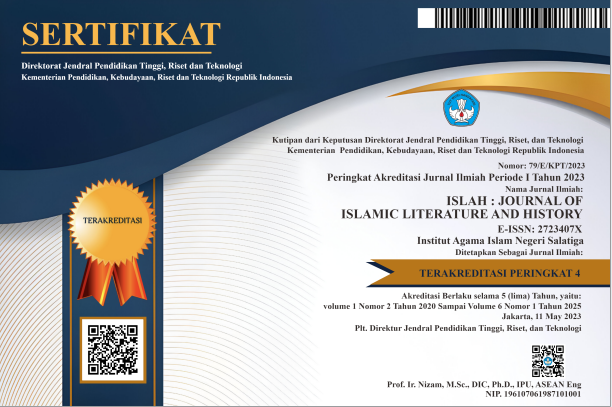Classical Islamic Political Thought: Study of Sunni Perspectives
Abstract
The purpose of this study is to determine the Islamic political thought in classical Islam in the perspective of the Sunni sect. This research is a qualitative research which is library research. Data collection method is library data that has been selected, searched, presented and analyzed. This study uses data analysis techniques in the form of content analysis. Content analysis is a scientific analysis of the message content of a data. One of the characteristics of the classical era Islamic political thought is that it does not question the position of religion and state, whether integrated or separate. The debates that occurred in the classical era on the establishment of a state, the election of a head of state, and the conditions that a head of state must-have. Besides, political thought that develops also tends to be a response to the prevailing socio-political conditions. The emergence of Sunni ideology is a form of anxiety over the viewpoints developed by groups that tend to discredit the position of the Prophet's companions who are considered by some on the opposite side to have committed treason or treason. For Sunnis, leadership after the death of the Prophet Muhammad was open and not limited to ahl Bayt. A background that is considered appropriate and competent can be proposed as a leader. Thus, the appointment or appointment of the caliph as the legal ruler depends on the specific qualities possessed by the prospective leader.
Keywords
Full Text:
PDFReferences
Abbas, S. (2010). I’tiqad Ahlussunnah Wal Jama’ah. Jakarta: Pustaka Tarbiyah Baru.
Akbar, Idil. (2017). “Khilafah Islamiyah: Antara Konsep dan Realitas Kenegaraan (Republik Islam Iran dan Kerajaan Islam Arab Saudi)”. Journal of Government and Civil Society, 1(1).
Ali, S. M. (2007). Hussain The King of Marytyrs Raja Para Syuhada. Jakarta: Lentera Hati.
Al-Mawardi, I. (2014). Al Ahkam Al Sulthaniyah: Hukum-Hukum Penyelenggaraan Negara dalam Syariat Islam. Bekas: Darul Falah.
Amin, N. (2017). Paradigma Teologi Politik Sunni, Melacak Abu Al Hasan Al Asy’ari. Yogyakarta: Pustaka Pelajar.
Amin, S., & Siregar, F. M. (2015). “Pemimpin dan Kepemimpinan dalam Al-Qur’an”. Tanzil: Jurnal Studi Al-Qur’an.
Amini, I. (2005). Semua Perlu Tahu. Jakarta: Al Huda.
Arfiansyah. (2010). “Pemikiran Politik Islam: Sebuah Tinjauan Sejarah Terhadap Arus Pemikiran Islam Klasik sampai Awal Abad ke 20”. Substantia, 12(2).
Black, A. (2006). Pemikiran Politik Islam: Dari Masa Nabi Hingga Masa Kini. Jakarta: Serambi.
Fachruroji, Moch. (2008). “Trilogi Kepemimpinan Islam: Analisis Teoritik terhadap Konsep Khilafah, Imamah dan Imarah.” Jurnal Ilmu Dakwah 4(12).
Fadli, Yusuf. (2017). “Islam, Perempuan dan Politik: Argumentasi Keterlibatan Perempuan dalam Politik di Indonesia Pasca Reformasi”. Journal of Government and Civil Society, 1(1).
Hakiki, Kiki Muhamad. (2012). “Mengkaji Ulang Sejarah Politik Kekuasaan Abbasiyah”. Jurnal Tapis 9(1).
Hughes, T. P. (1982). Dictionary of Islam. New Delhi: Cosmo Publication.
Ja’farian, R. (2009). Sejarah Islam: Sejak Wafat Nabi SAW Hingga Runtuhnya Dinasti Bani Umayyah. Jakarta: Lentera.
Jafri, H. M. (1979). Origin and Early Development of Shi’a Islam. New York: Longman.
Katsir, I. (2002). Bidayah Wa Nihaya: Masa Khulafa’ur Rasyidin. Jakarta: Darul Haq.
Makmun, A. R. (2006). Sunni dan Kekuasaan Politik. Ponorogo: Ponorogo Press.
Munawwir, A. W. (1984). Al-Munawwir (Kamus Arab-Indonesia). Surabaya: Pustaka
Nasution, H. (1986). Teologi Islam: Aliran-aliran Sejarah Analisa Perbandingan. Jakarta: UI Press.
Nasution, H. (2008). Islam Ditinjau dari Berbagai Aspeknya. Jakarta: UI Press.
Progressif.
Ritaudin, M. Sidi. (2009). “Spirit Islam Politik Periode Al-Khulafa Al-Rasyidun bagi Negara Kesatuan Republik Indonesia”. Jurnal Tapis 5(10).
Rusli, Ris’an. (2015). “Imamah: Kajian Doktrin Syi’ah dan Perdebatan Pemikiran Islam Klasik”. Intizar 21(2).
Sjadzali, M. (1999). Islam dan Tata Negara: Ajaran, Sejarah dan Pemikiran. Jakarta: UI Press.
Sunanto, M. (2003). Sejarah Islam Klasik: Perkembangan Ilmu Pengetahuan Islam. Jakarta: Kencana.
Syarif, M. I. (2008). Fiqh Siyasah: Doktrin dan Pemikiran Politik Islam. Jakarta: Erlangga.
Thabathaba’i, M. (1989). Islam Syi’ah: Asal-Usul dan Perkembangannya. Jakarta: Grafiti Press.
Thabathaba’i, M. (1992). Inilah Islam. Bandung: Pustaka Hidayah.
Zahrah, M. A. (2010). Aliran Politik dan Aqidah dalam Islam. Jakarta: Gaya Media Pratama.
DOI: https://doi.org/10.18326/islah.v1i2.137-153
Refbacks
- There are currently no refbacks.
Copyright (c) 2023 Suyadi Suyadi, Ahmad Fikri Sabiq

This work is licensed under a Creative Commons Attribution-ShareAlike 4.0 International License.
Publisher:
Faculty of Ushuluddin, Adab, and Humanities
Institut Agama Islam Negeri (IAIN) Salatiga
Jl. Nakula Sadewa V No. 9, Kota Salatiga, Jawa Tengah 50722
Lt. 2 Gedung Skretariat Fakultas Ushuluddin Adab dan Humaniora














